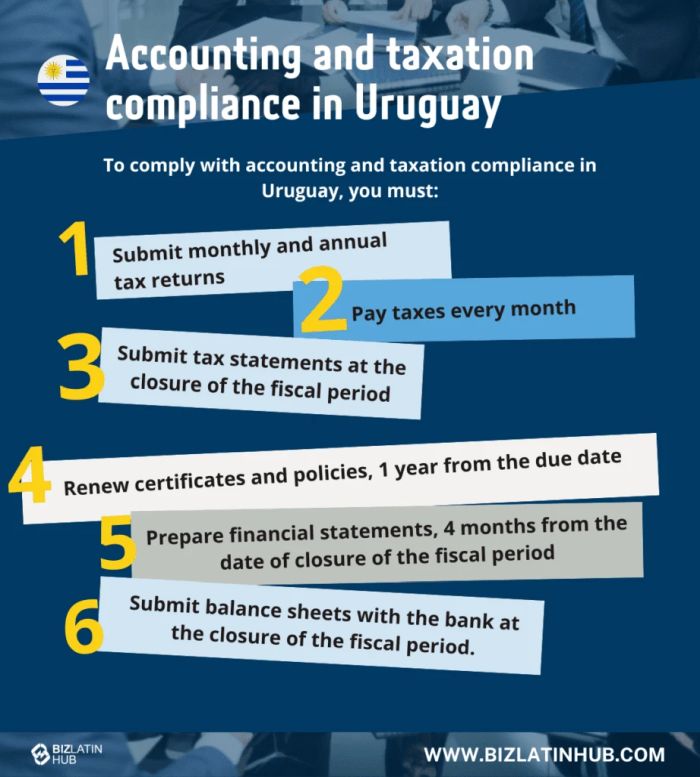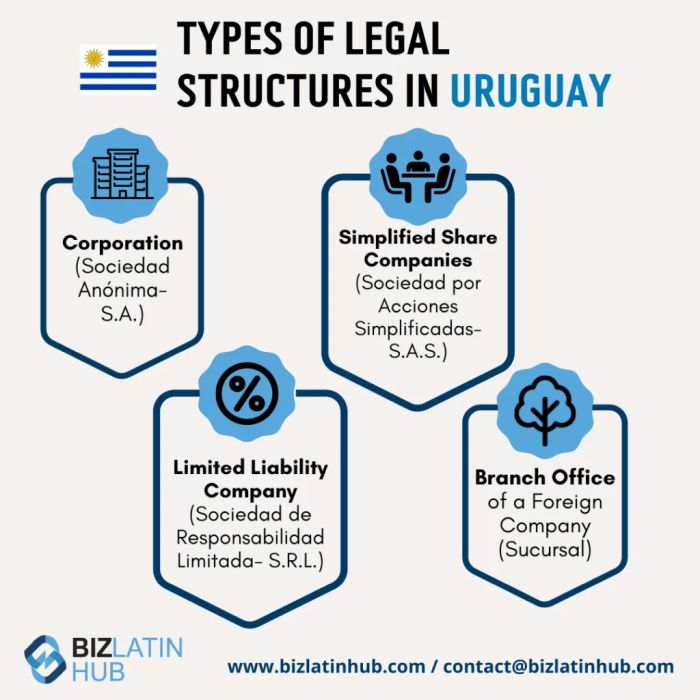Between 2003 and 2019, Uruguay underwent its longest-ever period of economic expansion. The foundation of Uruguay's economy lies within its agricultural sector. This sector plays a pivotal role in the country's export industry. Notably, Uruguay exports a diverse range of products, including meat, cellulose, grains, dairy products, wood, pharmaceuticals, and various services. Agricultural-based products account for over 60 percent of Uruguay's total exports. Additionally, food processing and refining agricultural products make up over 60% of Uruguay's total exports. These industries have corporate compliance requirements in Uruguay which we must take into account.
Uruguay distinguishes itself in the Latin American region by being a society that upholds equality and boasts a commendable per capita income. There are minimal levels of inequality and poverty and an almost total eradication of extreme destitution. In proportional measures, its middle class stands as the most extensive across the Americas. This encompasses over 60% of the nation's population.
The country's significant economic strides provide vital support for the pursuit of poverty alleviation and the fostering of shared prosperity. The nation has displayed a firm dedication to social protection matters. In Uruguay, there has been a long-standing focus on inclusive social policies that aim to expand program coverage to encompass the entire population. Now, let's delve into entity corporate compliance requirements in Uruguay.
Uruguay is a very politically stable country with high legal security. It has a non-discriminatory investment policy with no restrictions on the participation of foreign capital. However, as you establish your business, you must be aware of corporate compliance requirements in Uruguay.
Legal structures in Uruguay
A company must fulfill the essential corporate compliance requirements in Uruguay to operate freely within the nation once it has been properly established in Uruguay. Upon seeking the assistance of a local specialist, these legal responsibilities are not very arduous or intricate.
Uruguay presents various legal frameworks for enterprises to establish their operations, ranging from not-for-profit entities to publicly traded corporations. A foreign enterprise has the option to establish a legal entity using one of the subsequent structures:
- Corporation (Sociedad Anónima- S.A.)
- Streamlined Share Companies (Sociedad por Acciones Simplificadas- S.A.S.)
- Limited Liability Company (Sociedad de Responsabilidad Limitada- S.R.L.)
- Foreign Company's Branch Office (Sucursal)

Accounting and taxation are included in Corporate Compliance Requirements in Uruguay
Corporate compliance requirements in Uruguay – Legal representation
Every established company in Uruguay is obligated to designate a legal representative. This representative assumes the responsibility of representing the organization before external parties. It is important to note that businesses aiming to expand within the country must appoint a legal representative during the company incorporation process. This is crucial to ensure one abides to corporate compliance requirements in Uruguay.
The legal representative bears various responsibilities, including:
- Acting as the authorized legal representative of the company and conveying its intentions.
- Handling formalities with public and/or private entities.
- Representing the company in legal proceedings, if necessary, in collaboration with an attorney.
- Assuming the responsibility for tax and social security compliance on behalf of the company.
- Informing the Central Bank of Uruguay (BCU) about the composition of the company's Board of Directors.
In addition, foreign executives seeking to expand their operations in Uruguay must register a fiscal address to facilitate the successful incorporation of a local legal entity. This fiscal address serves as the official registered address of the company and is used for all official communications and correspondence. It is worth noting that the fiscal address must be explicitly stated in the company bylaws in order to be legally registered during the company incorporation process. This will help ensure one is abiding by corporate compliance requirements in Uruguay.
Labor and social security compliance
Executives overseeing companies operating in Uruguay must ensure their familiarity with the various legal obligations regarding employee payments. These obligations encompass salaries, social security contributions, payroll taxes, and severance payments to employees.
Moreover, business owners are responsible for providing workers' compensation insurance and a bonus known as the "thirteenth salary," which is typically paid every six months or at the end of June and December. The bonus amounts to one month's salary, divided into two payments. Additionally, employees are entitled to 20 days of paid vacation.
The obligatory social benefits for employees in Uruguay include:
- Health contributions
- Retirement contributions
- Occupational risk contributions

Learn about the types of legal structures and Corporate Compliance Requirements in Uruguay
Accounting and taxation compliance
When establishing a company in Uruguay, it is crucial to take into account the local accounting and tax system in order to obey by corporate compliance requirements in Uruguay.
To adhere to the accounting and taxation requirements for corporations in Uruguay, the following measures must be taken:
- File monthly and annual tax returns.
- Make monthly tax payments.
- Submit tax statements at the end of the fiscal period.
- Renew certificates and policies within one year of the due date.
- Prepare financial statements within four months from the closing date of the fiscal period.
- Provide balance sheets to the bank at the conclusion of the fiscal period.
Common Questions for Entity Legal Compliance in Uruguay
Based on our extensive experience these are the common questions and doubts of our clients when looking to operate within the country
1. What are the common statutory appointments for a company in Uruguay?
The following are the most common statutory appointments for Uruguayan legal entities:
- An appointed Legal Representative who will be personally liable, both legally and financially for the good operation and standing of the company. This should be a local national or a foreigner with the right to live/work in the country.
2. Is a Registered Office Address needed for a legal entity in Uruguay?
Yes, a Registered Office Address or local Fiscal Address is required for all entities in Uruguay for the receipt of legal correspondence and Governmental visits.
Engage with our specialists to meet your corporate compliance requirements in Uruguay
Before expanding your operations to, it is vital to have a thorough understanding of your corporate compliance requirements in Uruguay. While opportunities to do business in Uruguay are numerous, so are the risks for those who do not comply with local law. Therefore, working with a trusted legal and accounting firm is the fittest option.
Originally published by 13 August, 2020
The content of this article is intended to provide a general guide to the subject matter. Specialist advice should be sought about your specific circumstances.

